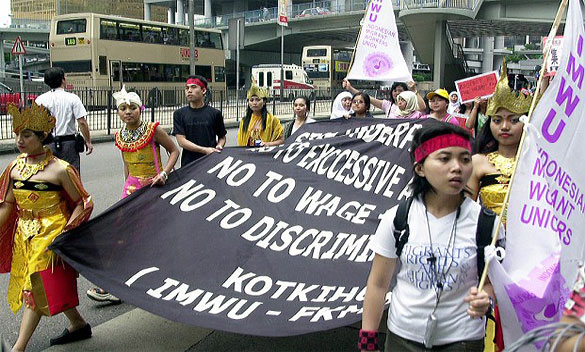At a run-down bus terminal in a small village, Yanti couldn’t hold back her tears as she hugs her three year old son while waiting to board a bus to the airport. She is to leave her family behind in search of better job opportunities overseas. Yanti is not alone; she is joined by thousands of other migrant workers who are eager to fill the vacancies of domestic helpers, construction workers and other low level openings overseas; jobs often shunned by the locals.
With an estimated 6.5 million Indonesians currently working overseas, Indonesia is one of the world’s top exporters of (mostly unskilled) human labour (TKIs – Tenaja Kerja Indonesia).
The Bad
The escalating wage gap between Indonesia and its neighbouring countries has prompted many Indonesians to seek jobs beyond its borders. For many, the promise of potentially earning five times more income outweighs the numerous horror stories they often hear of unpaid salaries and sexual abuse.
Surprisingly, there are no regulatory bodies that set and monitor the agency fees. Some employers pay the agency fees upfront and have it deducted from the TKI’s pay-check over the first six to twelve months of work, some with an arbitrary interest rate applied (ranging from 7 percent to as high as 50 percent). On the other hand, some TKIs pay the fees from their own pockets and have to go to the extent of selling the family’s cow or borrowing from friends to pay the agents.
It’s not just the unscrupulous agents that are out to overcharge them. From the immigration officers who stamp their passports to the marked-up plane and bus fares, to the unfavourable exchange rates offered by money changers, the TKIs are fleeced for everything in their pockets.
Furthermore, most contracts are signed between the TKIs with a recruitment agency and not directly with their employers. This often leads to limited transparency around contract terms and clauses, causing contract substitution, pay discrepancies, and even fraud at the expense of the TKI.
The Ugly
According to the National Board for the Placement and Protection of Indonesian Overseas Workers, thousands of Indonesians are cheated, beaten, raped, and tortured by their employers abroad each year.
Another NGO, Migrant Care, reported that 1,075 Indonesian workers died in Saudi Arabia and Malaysia in 2011, 80 percent from abuse or execution for committing major crimes. It also reported that 471 Indonesian migrants returned from the Middle East pregnant as the result of rape, and an additional 161 returned with children who had been born in the Middle East.
The Indonesian government has been justly criticized in the past for failing to actively protect its TKIs.
The Good
In response to the headlines of ill-treatment and harsh working conditions, President SBY’s office has been pressuring its foreign counterparts for assurances on labour protection and improved benefits: minimum wages, fixed working hours, holidays and health insurance. It’s good to know that this is making headway as some countries had already agreed to some of Indonesia’s terms.
Indonesian nurses are in high demand overseas and are often placed in the USA, Europe, Japan and the Middle East. Indonesian nurses who work abroad receive a much higher salary compared to their counterparts back home. In Kuwait the salary is around USD 2,200 while in the Netherlands, Indonesian nurses could earn up to USD 3,000 per month. A government survey showed that factory labourers or maids who earned about USD50 a month in Indonesia can earn USD250 a month or more overseas.
Despite the unfortunate events suffered by some, many do experience a change of fortune once they work overseas. With their improved income, they could now afford the little luxuries they’ve always wanted and still manage to set aside a sum to be sent home.
Last year, TKIs collectively remitted a staggering USD 6.5 billion back home, up from USD 3 billion in 2005. For their families, the money surely was a welcome boon, which has contributed to the increased domestic consumption that has helped power Indonesia’s economic growth over the past few years.
Success stories of TKIs returning to start their own business or renovating their village homes into becoming the ‘skyscraper’ of their village have encouraged and appealed to those contemplating to work abroad.
Conclusion
In today’s globalized world, people will go to where the opportunities are. Therefore, better-paying jobs need to be created locally to show the TKIs that the best opportunities are at home. This would be in line with the government’s aim to stop sending any more domestic workers abroad by 2017.




